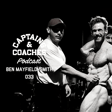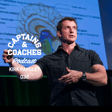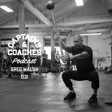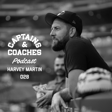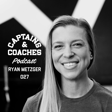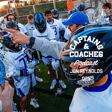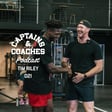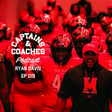Introduction of Dr. Mike T. Nelson and his work
00:00:00
Speaker
Today I'm joined by Dr. Mike T. Nelson, Extreme Human Performance Specialist. Dr. Mike is the go-to in the fitness industry for everything heart rate variability, HRV, and metabolic flexibility, carbs, fats, energy systems, all that fun stuff.
Protein intake and adapting training for youth
00:00:19
Speaker
So we explore a little bit of those in this episode as well as deep dive into the new book coming out, Triphasic Training 2, which he co-authored with Cal Deets. This is an awesome episode, how much protein to eat, how to prevent heat-related injuries in training during the summer, and then some specifics on how to Adjust the triphasic training for high school athletes if we don't have all those amazing gimmicks, spotters, overloads, all the crazy tools that we see out there with the triphasic training.
Promotion for Bold Bull program
00:00:53
Speaker
This episode of Captain's Coaches Podcast is brought to you by the program Bold Bull. For a seven-day free trial, click the link in the show notes. This is an efficient and effective strength and conditioning program
00:01:06
Speaker
where you choose your own adventure and workouts. This is tailored to combine not only your physical development, but also your personal and leadership development skills. Every single day, I include a huddle in there to work on self-leadership that you can bring to your office, your team, or your family. Click the link in the show notes for a seven-day
Dr. Nelson's current projects and book work
00:01:28
Speaker
free trial. Without further ado, let's hand it off to Dr. Mike T. Nelson. Ready, ready, break.
00:01:43
Speaker
Here we are. Action. Welcome to the Captains and Coaches Podcast. I am your host, Tex McCoke, and I am joined by Dr. Mike Nelson. Dr. Mike, how are you doing? I'm doing good. How are you? Doing well, man. I appreciate you taking the time to join me on the podcast.
Understanding metabolic flexibility
00:01:59
Speaker
You're a very busy man ah in the middle of three books right now. That is correct. I ah do not recommend that to anyone.
00:02:09
Speaker
yeah Well, they're they're targeting to change the world, so we're looking forward to it. We're going to get into triphasic two at the end of the podcast. What are the other two books that you're working on that we can look forward to?
00:02:22
Speaker
Yeah, the other one after that is a book that I've done with my friends Dean and Jeb. You probably know Jeb, Jeb Stuart Johnson. And it's basically the idea of a high flux rate and the easiest way to equate more calories coming in and more calories coming out of the system, that if you can push both of those up, you'll get better and faster adaptations. And the primary method we're doing that is just by promoting simple walking.
00:02:52
Speaker
So very easy intervention, you don't have to need any equipment, most everybody can do it. um And just showing a fair amount of data of, you know, how many steps do you need to be where you're at, how society just kind of changed over time. And then.
00:03:07
Speaker
ah The other book is on metabolic flexibility, which we'll talk a little bit about today. It's more for, let's say, intermediate consumers, not necessarily coaches. So the different aid interventions that people can do to increase their metabolic flexibility, which will help them with their ability to perform and improve their body composition and also improve their health all at the same time.
Coaches as role models for nutrition
00:03:31
Speaker
And that's exactly where I want to start. So a lot of coaching is modeling. So looking the part, acting the part, and with some simple understanding of metabolic flexibility, these are tools and tricks where I'm not going to call them bio hacks because that's for hacks, simple tools and tricks that coaches can apply to then look the part and really get the most out of their training.
Evaluating carb loading for athletes
00:03:57
Speaker
So let's start with there. What's a general over overview of metabolic flexibility? And then we'll get into the energy systems. Sure.
00:04:08
Speaker
So the three basic pillars of metabolic flexibility are on the sort of, you think of fuel usage, like ah where you're getting your calories from. On the right hand of the spectrum, like if you imagine a kind of a dumbbell, a barbell loaded model, you have carbohydrate metabolism. So the real assembly, how well can your body use and process
Nutrition challenges in young athletes
00:04:30
Speaker
On the other end of the spectrum, say the left side, you have how well can your body use and process fats. These could be dietary fats that you're consuming from food. This could also be a stored body fat, just like carbohydrates could be carbohydrates you consume, they could be stored in the form of what they call muscle glycogen.
00:04:48
Speaker
or liver glycogen, just simply stored carbohydrates in the body. And then the third component is how fast you can switch back and forth
Effects of caffeine and energy drinks
00:04:57
Speaker
between the use of carbs to the use of fat, back to the use of carbs in terms of just the timing. For example,
00:05:05
Speaker
If you go to the gym, you're going to do a heavy weight training session. Your preferred fuel source for that is going to be carbohydrates. But once you're done with that session, the preferred fuel actually switches pretty fast to fat metabolism. So the third pillar of metabolic flexibility is how fast can you switch back and forth between the use of fats and the use of carbohydrates as fuels.
00:05:29
Speaker
That is a simple approach. And so now a big theme in the the world of fitness is calories in and calories out. So does this support that simple thinking or do we now get a little bit more advanced?
00:05:46
Speaker
Yeah, it's a good question. So I get interesting emails from people sometimes who are like, Oh, but you didn't say the whole podcast was about calories in calories out. So therefore you don't believe in that. It's like, no, I'm, I'm saying that yes, you definitely need to take care of your calories, calories and calories out still works. Like, trust me, I did, uh, my masters was in mechanical engineering, so I had to suffer through thermodynamics one thermodynamics to heat transfer like I got beat over the head with all of these concepts and there's no violation of the laws of physics. So calories in calories out still works. That's still a thing.
Understanding and using Heart Rate Variability (HRV)
00:06:23
Speaker
However, then once we're on agreement of that,
00:06:27
Speaker
where you get your calories from and how you get your calories is obviously going to matter, right? You could argue that, well, I'll just get all my calories from, you know, Skittles, Ho-Hos and Twinkies versus, you know, whole foods and vegetables and fruits and rice and protein and that type of thing. Yeah, your calories in and out might be equivalent, but your performance, your health and all your things are going to be radically different there.
00:06:54
Speaker
So yeah, by all means, make sure your calories are sufficient with your goal. But once you've done that, then we can have a little bit more nuanced conversation ah about where we want to go and what we want to do. Yeah. And most coaches, parents, we're all busy professionals. So then where we get our calories really starts, starts to matter. So as we age, does this, the, the Twinkies, the ho ho, does that affect us differently?
00:07:23
Speaker
Most likely, if we look at a general population, the answer is unequivocally yes. However, to the person listening, that's not a very useful answer because they're probably not like most of the population.
Preparation and stress management for competitions
00:07:38
Speaker
And if we equate age and activity, so for example, one of the things people say is,
00:07:44
Speaker
Oh, when you get older, your metabolism just slows down. And on average, if you look at a general population, that is true. Now the caveat within that is, if you keep the same level of activity that you did when you were younger, metabolism really doesn't start to slow down much to your 60, 65 maybe. So you have a much, much longer runway um to play with there. So I would say, yes, it's a thing, but for more of the listeners of this podcast, they're probably going to be pretty well protected because they're doing a fair amount of activity. They're lifting, they're staying active. Hopefully they're doing some cardio. They're doing all those things that's going to keep that carbohydrate metabolism working much better, much longer.
Post-game recovery strategies
00:08:27
Speaker
They're generally carrying more muscle mass than the average person. Muscle is going to be a lot more metabolically active. So even when they do something as simple as walking,
00:08:36
Speaker
Just being a bigger mammal with more muscle, you're literally burning through more calories by doing what looks to be a similar task. So now how do we adjust? What's a simple way that somebody can adjust calorie intake from carbohydrates to fat? So if I'm, I'm active, just coaching on my feet all day, but don't have the opportunity to train, should I lean more towards fats? How does this affect my plate versus days that I can get in the weight room?
00:09:07
Speaker
Yeah, the the simple approach I use is for people who are going to be active, where you know that you're generally metabolically healthy, you know, you're going to have days of activity where it may just be a lot of what we call a neat non-exercise activity, thermogenesis, walking around, moving, twitching, coaching on your feet, you know, all that kind of stuff, but you're not, maybe it's an off day. You're not necessarily formally lifting.
00:09:31
Speaker
If your goal is more performance and body comp, I would say on those days, your intake from carbohydrates generally is going to be a little bit lower. You're not doing the things that you really need carbohydrates for metabolic flexibility standpoint. Hopefully you're running a little bit more off of fat.
00:09:51
Speaker
So what that would look like is I tend to keep protein relatively high across the board. So if you look in the research, you're looking at 0.7 grams per pound of body weight. So if you're a two and a pound person, that's 140 grams of protein per day.
Training in heat conditions
00:10:06
Speaker
Now again, you can go higher than that if you want. There's no real downsides to that. And if people hate math, a very simple metric I use is the four by 40 approach. Try to get four meals in and try to hit 40 grams of protein at each meal.
00:10:21
Speaker
Now that's probably going to cover 90% of people listening to the podcast, right? So once you've done that, I generally keep fat a little bit on the lower side. You know, if you want a number for total per day, yeah, 50, 60, 70, 85 grams, somewhere in there, nothing real high. And then your carbohydrate amount will vary depending upon activity. And the hardest part is that carbohydrates can vary a ton from one individual to the next.
00:10:50
Speaker
I've had, you know, novice strongman competitors that were at a lower end of carbohydrates. One guy, he was at probably 250 grams per day. And I had a natural physique female competitor who weighed 120 pounds. She was eating twice the amount of carbohydrates as him, which when you look at him, you're like, this makes no sense whatsoever. Right. So it will be variable.
00:11:17
Speaker
But you're trying to find that sweet spot where your performance is still good and your body compass kind of, you know, where you want it. So a real simple thing. Like if you're looking at your plate each day on a day that you're maybe coaching a lot and you're not super active, you're going to have a fair amount of protein. You might have a little bit of carbohydrates in terms of, you know, some vegetables and some fruit. And, you know, maybe put a little olive oil or something on your, your meat.
Overview of 'Triphasic Training 2' methods
00:11:39
Speaker
Probably pretty good to go on those days. You're going to do more training and then it would add more starchy carbohydrates. You can go with.
00:11:46
Speaker
you know, white rice, or if you don't have any gluten issues, you can, you know, add some breads or English muffins or sourdough or whatever sweet potatoes, you're just going to bump up the amount of carbohydrates you're going to have on those days, because you're going to use them more when you're training heavier on those particular times. Yeah, I'm tracking on that people can certainly make make those adjustments if they're conscious and a big part of this is bringing awareness to it. So now if we're aware, it affects our our behavior. And then again, I want to emphasize coaches being the models. So kids are are always looking for a shortcut. So if I'm telling them to do XYZ or even eat broccoli, eat this, not that, and they catch you, then it's almost green light permission for them to do the opposite of your word.
00:12:38
Speaker
All right. Yes, I i agree. So in in line with that, now the the teenagers speaking to it, there are so many just misnomers and i've I've been coaching high school athletics for a long time where parents are very active for pregame meal or night before meal and pasta dinner. So big pasta dinner is always the thing, whether we're talking football, lacrosse, all different sports. So now.
00:13:06
Speaker
Carboloading, normal parents, they're volunteering their time, food, and money to to make it. What's our optimal night before meal? Is carb loading a real thing for a sport like football? Again, I would say If you look at the research and if you look at general population, even just general athletes, if they're, so if I have an athlete who's pretty dialed in, you know, throughout the week, they're pretty compliant. We've been working together for a while. We've got stuff figured out. Do I have them do a huge carbo load before big games? Honestly, I don't personally. I just like to keep things the same. I want to make the middle amount of changes. I know the performance is good and I can iterate from there.
00:13:49
Speaker
However, if I were to give advice to teams, especially in the high school setting, even sometimes in college, and they said, Hey, we're going to do this big carbohydrate loading dinner with pasta, rice, whatever the night before a big game. Should we do this? I would say unequivocally yes, because most of those athletes, I can almost guarantee are underfed. They're not getting enough calories. They're sure as hell usually not getting enough carbohydrates.
00:14:17
Speaker
And if you were to give them a
Eccentric overload techniques
00:14:18
Speaker
fair amount of carbohydrates, which they can then store overnight as glycogen, would you want to do that the day before or the night before a big game? I would say yes. So in reality, I think it's probably much better than what unfortunately most of them are doing on their own. Yeah, I can definitely see that. The underfed is is big. it's i mean the Uh, the challenge there is, is emphasizing, I guess the, the words that I put forth are protein, protein, protein, but I can see them just being ah underfed all around. Uh, yup. Yeah. The, the high school, even early college athletes I've worked with is more on the male side, although it definitely a hundred percent happens on female side too. Um,
00:15:05
Speaker
It's a vast majority of them just don't eat enough, you know, period. Like for almost is even in sports where power to weight ratio is important. Right. I mean, I've lost track of how many.
00:15:19
Speaker
Yeah. How many dietary logs I've looked at where I know for sure they're not hitting close to the amount of calories. Unfortunately with guys and in the sports like football, it tends to be more erratic. They'll under read during the week and then like the weekend, they'll just go off the rails and go crazy. You know, so that happens too. Yeah. When I i was at the college level with football, there'd be one access door into the weight room and then a dietician waiting there and it's always check in body weight.
00:15:48
Speaker
So check in, weigh yourself. And then this is multiple reasons during the summer, especially hydration levels, just being and in Texas, being hot as hell. So hydration levels. And then in season, it was, it was connected to how much you're eating. And I mean, at division one, these guys got a freaking dream scenario where they, they weigh themselves and have this beautiful platter, just hand it to them to specific to their needs, uh, at some of those power for schools.
00:16:18
Speaker
So yeah it's everyone else we're worried about just freaking go to the calf and load up. Yeah, exactly. And like you mentioned, I just use daily body weight for almost all my clients.
00:16:30
Speaker
It's cheap, it's easy to do, just get up in the morning, yeah use the bathroom, whatever, hop on the scale. Most scales now will auto-log it into a system, like almost all my clients are remote.
Implementing isometric training safely
00:16:40
Speaker
So I can look and see body weight wise, what they're doing. Yes, I know that's not body composition, but if they're trending up or they're trending down,
00:16:49
Speaker
We'll be able to know like right away because say, for example, football, ah high school, early college, if they're under reading and they start doing practice, like you're going to see their body weight start to go down. And the second we know that that's a trend, we can be like, hey, you know, one awareness, do you know this is actually going on? Most of the time they're like, oh, wow, I didn't even know that. Right. And then now you can hopefully get some buy in and you can intervene.
00:17:13
Speaker
Versus, you know, you're six, eight weeks in, you know, bro's lost like 11 pounds. His performance has gone to shit. Now he gets injured and he can't figure out what happened. Yeah. And man, then it's tough to undo because you got to trace it back a number of weeks. And then it's difficult to to make up that loss of body weight.
00:17:33
Speaker
So what are, what are some things that happen to the body when we're under eating? Is it true that you now start to just eat muscle so your body is in survival mode? You, yeah. So if you're a healthy person, you get very active as a lot of times this happens when formal training starts. People don't change the reading habits. They tend to eat the same, but now they're doing, you know, maybe a weight training session, skill session, they're doing two a days, that kind of stuff.
00:18:00
Speaker
Um, your body is going to try to get energy from anywhere it can. Now you will sometimes re composition. So some of that can come from stored body fat. Some of it will come from stored carbohydrates, which are going to be a limited store and you can't run stored carbohydrates as glycogen down to zero. Like the best you can deplete them is maybe to 30, 40% levels. And you will see, if you're hanging out at the 30, 40% level, your performance will definitely be lower. So you don't really want to hang out there.
00:18:30
Speaker
you will oxidize some amino acids. So you will burn some amino acids or the breakdowns of proteins. um So some people will lose muscle mass. It's harder to say in the high school and college setting because you are weight training, you are doing activities to try to offset that. um But you're definitely not putting yourself in a good scenario to keep as much muscle as possible or even add any muscle tissue.
Concentric training strategies
00:18:57
Speaker
So you're already at a disadvantage. How much of a disadvantage is kind of up for debate? Um, but yeah, you're definitely behind, behind the eight ball for sure. Yeah. And then that they're, they're poor energy. but There's a huge wave and this has been going on for, for decades, even when I was a college athlete of energy drinks.
00:19:21
Speaker
Yes. So under eating, I don't have energy. I'm feeling piss poor. So now I'm going to tap into and energy drinks. Is there any research or guidance or advice that you can hand off to coaches and athletes for energy drinks connected to physical activity performance on the field? There's mixed research. Um, so some of the research I did for my PhD was actually on energy drinks. So I did look at monster energy drink in terms of performance.
00:19:51
Speaker
ah cycle time to exhaustion, HRV, resting heart rate. What we saw is that heart rate went up a little bit. HRV in an acute setting didn't change much, and it was kind of mixed if it really enhanced performance or not. The main, what they call it ergogenic aid, or the thing that's increasing in performance there is going to be caffeine. That's by far and away the top one. So at a high enough dose, we do know that caffeine does pretty reliably increase performance.
00:20:16
Speaker
Now, the downside is it also has a cost. We know that caffeine can massively disrupt circadian rhythms and sleep patterns. So depending upon what time you're using it, especially if you've got evening practices or that type of thing, what I usually see in people is You know, Bob's not fed enough and he's tired. So it's 4 p.m. He's got to do his second you know training session of the day. He's going to grab, you know, a huge energy drink. He's going to drink that before. Feels pretty good, you know, makes it through whatever practice. And then now he can't go to sleep right away because he's, you know, still wired because he's having an energy drink at four or five, you know, p.m. of, you know, and two, three hundred or more megs of caffeine. And then he feels tired the next day because he slept for shit. And then the cycle just
00:21:04
Speaker
Kind of sort of repeats itself again.
Quality training for athletic performance
00:21:07
Speaker
Yeah, that's how I would take it. The approach that would be my target is, is not getting them on the energy drinks at the, the 4PM or pre-practice or even pregame when we got a late game, yeah I would connect it to now that the psychology side of things where it starts to become a crutch.
00:21:28
Speaker
similar to know somebody with luck or I don't have my lucky socks or my lucky jockstrap. Oh, yeah, can't perform. Now it's I need the energy drink. I need that. So almost acting like it's ah a ah crutch, a drug for them, and telling them that they don't need it. If they do need caffeine, here's espresso, like take a shot if you believe that's gonna be better. But certainly all the the chemicals and stuff in the energy drinks.
00:21:55
Speaker
get them ah away from that and off of the belief that they, they fiend they need this to actually execute and perform well. Yeah. And most of the time it's.
00:22:07
Speaker
I don't know if we can say any drinks are necessarily bad per se, but they're definitely not replacing the carbohydrates. They're not a source of protein. They're very poor source of electrolytes. um And usually I would say most athletes I've worked with, once they get their nutrition, you know, kind of dialed in to get their carbohydrates, we've kind of fixed some of their sleep, get them AM sunlight exposure, like some real simple things that don't necessarily even cost a lot of money.
00:22:34
Speaker
In almost every case, their use of energy drinks drastically goes down by their own selection, which is kind of what I want. They're like, oh, I don't really feel the need for this. Oh, wow. My sleep is so much better. And then on the rare occasions, they do have one. They're like, oh, my God, my sleep was all messed up that night. And I forgot how crappy I feel the next morning. And so then they'll kind of self-select away from them again, which is exactly what I want, because Obviously, I'm not going to be there yelling at them the whole time or whatever. You want them to be you know adult enough and have the better experiences so that they're intrinsically just making better decisions on a day by day basis. so Yeah. And so that aim is increasing that self-awareness. So when you start to work with
Where to find more about Dr. Nelson
00:23:17
Speaker
clients for the first time, what are some markers to increase awareness that then effectively gains buy-in for your guidance?
00:23:25
Speaker
Yeah, if I were to go back in time, I'd say the biggest mistake I made was assuming I would tell an athlete to do something and they'd do it.
00:23:34
Speaker
I just assumed I'm like, bro, like you hired me, you're paying me a lot of money. Like I, I'm assuming you're going to do the thing. And then I fastly realized, of course, right away that, uh, no, even at, you know, the elite level, that doesn't always happen. Again, there's, there's obviously exceptions to that. Um, and so the biggest thing that helped me was, okay, instead of me just telling you what to do, can I do something where you have a higher level of awareness now and you're going to ask me what to do?
00:24:04
Speaker
So for example, real simple thing. I just want you to log all your nutrition, ideally for seven days, but how even give me three days, I'll take three days. And then instead of me looking at it, telling you what to do, I'm going to flip it and be like, Hey, all right, cool. What, what did you learn during this, uh, three day experiment of logging your food? And they might look at it and they go, Oh, wow.
00:24:24
Speaker
I don't really get a lot of protein. Oh, okay. Cool. Do you think eating more protein would help you in your, you know, football practice, adding more muscle, being able to recover faster? Yeah, I think it would. All right. Cool. Well, what, what kind of protein do you like? I don't know. I guess I could eat chicken or maybe add a protein shake. Cool. All right. And then I will just.
00:24:42
Speaker
Basically just walk them through what they would do instead of me saying, okay, you need X amount of protein. You need to eat tilapia before every game or, you know, whatever the hell of the thing is. Yeah. Um, even with stress, I do this with HRV all the time in sleep. They'll do HRV, which is a marker of stress and a little log their sleep, which could just simply be what time did you go to bed? What time did you get up? Like you don't need anything super fancy.
00:25:06
Speaker
And I'll send them a graph of their stress level going bonkers and their sleep just plummeting. So you'll basically see stress going up. I'm in bed going down. I'll literally just graph this on Excel really crudely and send it to them and be like, Hey, what do you think is going on here? And they're like, Oh my God. You mean when I get more stressed, like I don't sleep as well. And I don't, you know, I stay up later and all these other things. I'm like, yeah. So but is that something you'd want to work on?
00:25:33
Speaker
Oh, yeah. Yeah. Okay, cool. Yeah, I get it. So I try to make everything I call just the awareness game. Like how can I make them more aware of what they're doing? Because it's a weird thing, especially with nutrition, because if you ask someone what they ate yesterday, they can rattle off a whole bunch of things. But we know that recall isn't like super accurate. And just getting them to be more conscious of what they're doing and then asking them, okay, here's, I have some ideas. I've seen this before. What do you think is going on? And then just guiding them through that in terms of behavior change makes a huge difference. Yeah.
00:26:13
Speaker
that That's a great place to start. And then, I mean, the beauty of a team, now we can make connections to to roommates or same positions and they can start to yes hold each other accountable. If we're aiming again, create that awareness. We're educating versus shaming, condoning, or ah yeah, I mean, any other practices that definitely don't work when it comes to adherence.
00:26:41
Speaker
Uh, yeah, that's, yeah, that's great. And one of the, the, the big things I heard from a friend of mine, she was a Olympic downhill skier and she was starting in this years ago, got into HRV and I was talking to her about it and I was asking her, I'm like, well,
00:26:55
Speaker
How do you get like your, your clients to like, especially at more on the elite level, how do you get them to relax and just like do recovery stuff? You know, this is back 10 years ago before recovery was really an invoke thing because they just want to train more. They just want to do more all the time. Like, bro, if I could just do more, I'll win. And she's like, well, I just have them compete now in recovery. So that she would have little competitions of, did you get in, you know, did you hit your macros? Did you hit your micros? Are you doing this, whatever you pick for recovery? Are you doing some breath work? And.
00:27:25
Speaker
then she would monitor their HRV, and she would have it be kind of a little bit of a competition. So like, it's not a perfect solution, but because these athletes are so hyper competitive to begin with, at least they're doing more of the things that are gonna help them instead of just more stimulus, more training, more training all the time. Yes, and with HRV, it gives you green light, yellow light, red light, more more or less. Am I summarizing that pretty basic?
00:27:55
Speaker
Yep. So most systems on HRV is just the measurement you take first thing in the morning. Some things like Aura will give you a measurement overnight or Garmin. And then most of the systems will equate it to, like you said, a traffic light green, meaning, Hey, your stress levels are pretty good. Don't make any changes. You know, Amber yellow. Yeah. You look a little bit more stressed, like, yeah you know, kind of watch out. And then red would be like, Ooh, probably do something completely different.
00:28:20
Speaker
um And that can be useful too. You do have to know the system, you do have to know ah the pros and cons of how it's being measured, all those kinds of things. But again, back to awareness, the thing I like the most about HRV is you're not telling someone not to train, you're just showing them here's the cost of all of your behaviors. So for example, if I know a client is prone to go out drinking with the boys on Friday night,
00:28:46
Speaker
Hmm. I may have them do an HRV measurement, especially Saturday morning. And Saturday morning may be a heavy squad or deadlift session, right? Because I'm going to purposely put that in a position where they're going to pay a higher cost for going out.
00:29:02
Speaker
Right. And I want them to be aware of that. So I want a physiologic measure that they can't argue with me about. And then I also kind of want them to feel what it sucks to do a few of those sessions hung over. And then you get to decide as the athlete, Hey, you know, was that Friday night worth it or not? I'm not going to tell you what to do or what not to do. I have a lot of suggestions, um but I'm going to rig the deck in every possible manner to try to get the outcome I want.
00:29:27
Speaker
without just yelling at you to to do what I want. That's high level coaching. Yeah, that's that's the essence of coaching, right? I mean, it's the same idea. Yeah. And in in line with that, seeing the the the green, the amber, the red, now on game days, if if I see red, is that detrimental to performance, do you think? Or is that a mental game that we need to prepare them way in advance for?
00:29:57
Speaker
Yeah, it's definitely the latter. I mean, that's, other than, I'm not using HRV to tell me how to coach people. It's usually the the main email I get from coaches. Usually followed closely by, well, what if the athletes read the day before a big game and then just mentally they just tank. And so I'm never going to measure HRV because that might happen. I'm like, well, I can tell you that if you have a big game coming up or big event or whatever,
00:30:24
Speaker
Hadzar, you're probably going to be a little bit more stressed unless you're at the elite level. And even at the elite level, it still happens there. um If you're a coach, you should know that that's gonna happen so you have to prepare people for it ahead of time. So what I'll do, like if I have someone who, powerlifting is an easy example because it's easy to measure, right? Measuring game performance is a little bit tricky. yeah um So with powerlifters, we would say, okay, we've got 24 weeks to prepare for this meet. We know we've got this big competition on this big day. We know you have to do these three lifts, right? It's very binary, it's very easy to measure.
00:30:58
Speaker
And they may be, you know, 12 weeks away from a big meet and they show up red on their HRV. And I'll look to see if their average, their seven and 21 day average is pretty good. And just that day was a high stress. I may tell them, okay, cool. Like, yep, your HRV is a little bit red, but I want you to go in the gym and still train, but I just want you to do a triple or a double or a single of what you plan to do. And then just shut it down after that.
00:31:24
Speaker
And they'll kind of look at me like, so you want me to do close to a max lift on a day? I'm super stressed. I'm like, yep. Like, okay, whatever weirdo. And they'll go do it. Most of the time they're like, Oh man, I got a PR or I got close to that PR like, cool. Perfect. Right. So then I'll explain to him that because you're more on the sympathetic side of stress,
00:31:42
Speaker
You know, powerlifting is easy because it's a very sympathetic dominant output thing that we're measuring. It's it's a maximal strength type thing. However, however we're not gonna do a lot of work on there because we are seeing that you are a little bit more stressed. But that doesn't mean that acute performance on that day is necessarily bad. A lot of times it's actually better. We just don't want you to live there day in and day out. Like, oh, okay, got it.
00:32:06
Speaker
And sure as shit, like you come up to a meet like Friday, the meet Saturday morning, you know, Friday, they're doing everything Saturday morning. They call, bro, my, my HRV is red. I'm like, good, great. Remember like 12 weeks ago, what happened when you had an HRV is red. Oh yeah. I got a PR of the gym. Cool. Like you'll be fine. We can take a bunch of days off, you know, afterwards. Don't worry about it.
00:32:27
Speaker
You know, so just, you know, same thing if they have a big game or whatever, you want some way of demonstrating to them. That is a real and legit thing. It's not a made up thing that, yeah, if you're stressed on one day, that's life, that's going to happen. And you'll probably be just fine. Now, again, we don't want to live there every single day, um but acutely, you're you're going to be fine. And odds are it's probably going to happen.
00:32:52
Speaker
Yeah. Yeah. I like that. I mean, that's, that's coaching again. I'm going to prepare for an event 12 weeks ahead of time. So we just have that memory banked ready for them to believe in them.
00:33:05
Speaker
in yeah And again, it's not you telling them, just trust me. yeah It's you referring them back to a real experience that they had where you were as a coach, correct. So they're like, Oh, okay. Like it, it's very different than just telling them, Oh bro, you'll be fine. It's like, okay, they might believe that, but most of them subconsciously are going to be like, ah, I don't know. I think coach is full of shit. Yeah. So yeah, having that proof that they,
00:33:35
Speaker
believe in themselves. And, uh, in line with competition, I want to, this is, this is a common argument, especially here in Texas after a football game on, we'll just say Friday night or Saturday night to come in and lift on the Saturday or Sunday. Some programs that's, that's the way it is. We're beat up. We're going to come in and start to train, uh, mentally, physically and get used to hard work. Other programs, Hey, Saturday off.
00:34:06
Speaker
come back on Monday. So you get one, two days off or Sunday off before we're back at it Monday. So is there benefit following maximal effort, intensity, intensities in, ten cities and in a ah football game, come in and then move lift and, uh, push some PRs potentially. If I was a bench player for my team. Ooh. So I'll give you what I would say is the the theoretical answer, which probably doesn't help anyone. And then I'll give you an actual practical answer.
00:34:39
Speaker
The theoretical answer would be, if you didn't play in the game at all, then definitely go train. like You probably can get by with a lot more training. If you're the starter and you put out a lot of effort, I would in a perfect world still have you come in, but all I give a shit about is just getting blood flow. like Do some zone two stuff, get in a pool, do some movement, do some mobility. like just get you know If you look at all the the the Russian you know recovery metrics and everything that they used, it was basically,
00:35:07
Speaker
all different ways just to stimulate blood flow, or that with sauna contrast therapy, cold water immersion, you know, massage, whatever E-STEM, like it basically just revolved around just getting more blood moving. um That's what I would do with people who were We're playing and feeling a little bit banged up because I can guarantee every time they're going to leave that session, probably feeling better. Yeah. Now we could argue, did I really help them a lot with recovery or not? I don't know, but I probably prevented them from being a slug on the couch for 48 hours, which I would argue is going to be a benefit. The reality is you may not be able to split the team that way. So I would, I would go more by.
00:35:51
Speaker
Do they need more general recovery, i.e. their work ethic is pretty good and they'll just kind of do whatever we want? I would probably just have a nice, easy, moderate session for everyone if I can't split them. If they're doing pretty good and they're just all beat up and mentally they the thought of doing anything extra is just not there, then I may just give them the day off. So I mean, I guess I would probably more decide based on the psychology than actual physiology, to be honest. Yeah. How, how I've managed that in the past to two different approaches. One is more or less a, a rep max. So if we're working up to a three RM front squat, well, if I'm starter quarterback in a a running first offense,
00:36:41
Speaker
I'm working up to my max that day, not a PR, but then if I'm third string, okay, now um now I'm pushing it because I have the legs, but it's the same definitely same workout for for everybody within the rep max. And then something else in the back pocket is is always just film day. If I'm a head coach, yeah stay up a little later, break down film, get there there in the morning,
00:37:08
Speaker
Because again, these are these are high schoolers. it's There's temptation everywhere. So if the film's at 8 AM, I'm less likely to then go stay out all night, a la Varsity Blues, and then continue to progress within my season. So I like i like just getting there. I like the movement component, ah especially where how you framed it as stimulating blood flow.
00:37:34
Speaker
But then so much so the the behavior side of things and protecting them from themselves. Oh, a hundred percent. I mean, there's the stories of the old, you know, Bulgarian system where people are like, Oh, you know, they would lift, you know, three to four days, you know, three to four times a day. And the story goes that one of the head Bulgarian lifting coaches, they asked him, they said, well, did you get better results by adding a more a PM session? Yeah. And he said, yes. And they're like, Oh, you mean you just you did get that much more volume and maybe a hormonal response or whatever. And he's like.
00:38:07
Speaker
No, I just prevented them from going out drinking that night because it had to be in the gym He's like I don't like anything to do with the volume It was the fact that they didn't go out on a bender till one in the morning figure There you go, yeah the the Bulgarian you're basically maxing out is it ones every single session yeah There's all different ways but it's It's definitely a meat grinder. And also the other part with that system too is like, there's a thousand people waiting in line to take your place. If you can't hack it. Right. It's like, if you're just not that gifted, like, great, just get lost. We'll get this other guy in here. He'll, he'll take your place. Right. Which the you can't really do that in the U S.
00:38:47
Speaker
but no Well, that that's a perfect transition. So speaking of meat grinder, a lot of the summer conditioning for is sticking with football. I mean, it's the most, most popular. So a lot of the summer conditioning happens when heat is at, at its peak humidity, especially here in the the Gulf coast, it's at addicts at its peak. And unfortunately we hear a story every single year of tragedy following.
00:39:14
Speaker
a summer conditioning workout, sometimes college, sometimes high school. So you've done a lot of research and work with heat exposure. So what are, what are some common components that could lead to fatal heat stroke, heat death, heat injury for conditioning practices? Yeah. I mean, the biggest thing is. I mean, yes, there's a lot of truth to hydration. Yes, you should use electrolytes, all that stuff will 100% make a huge difference.
00:39:43
Speaker
However, the the biggest thing I see is just too much work in too extreme of conditions, too fast, right? If you look at your body's ability to accommodate to the heat, like it is just like training your bicep muscle, your quads, your legs, your hamstrings, whatever, there's an adaptation period to being better able and more adapted to dealing with the heat.
00:40:08
Speaker
Now, if you have the luxury of doing it in a nice, progressive manner, you can get pretty close to, let's say, maximal heat adoption in two to three weeks. Like you're not going to hit true, true max, but you can make a lot of headroom in just two to three weeks. So it's not this thing of you need a year training to get ready for this or anything like that.
00:40:29
Speaker
Um, and in a team setting, you just have to be patient and just take your time. And you also have to remember that some of these people, especially it usually happens, you know, as they're coming back, they may have been trying in the off season. They may not have a lot of times they haven't. You're sticking a bunch of pads on them, which is going to prevent, you know, loss of heat and perspiration is going to get blocked and convection. And you're just limiting how well they can transfer heat off to begin with.
00:40:58
Speaker
they're probably not adapted to those conditions yet. And unfortunately, there's people who just push that too hard and you know you can die from heat stroke. And the other part that people forget too is that the body is super interesting, meaning that if you're very progressive, just like lifting, you can get some pretty good adaptations. But if you go too far and you push them too far and too soon and you start having issues,
00:41:28
Speaker
you can actually, I don't know if I'd use the word damage, but you can take the gain of how sensitive they are to heat, and you can crank that to like 10, where they become hypersensitive to heat in a very negative way. And I've seen that happen in several people where, you know, luckily they didn't die, but they got pretty damn close to it, and now any level of heat they are extremely intolerant of.
00:41:54
Speaker
right, because their body is saying, hey, we almost died from this heat thing. So we're going to take this gain, we're going to crank it. So we become so sensitive to this that we're going to build in this big safety, this buffer margin so that we can't get close to it again. And unfortunately, that's absolutely horrible for performance now.
00:42:13
Speaker
I think you can probably train around that. You can probably get out of it. We've done that with a couple of athletes, but you know, that's a long, many months, many year process. Um, so again, there's obviously a safety issue with it. You know, more hydration, uh, definitely include electrolytes. We don't see this as much now, but, uh, Boston marathon used to be, unfortunately, an example of people dying from what's called hyponutrenia.
00:42:37
Speaker
So you drink so much fluid that you actually lose sodium. And if you lose enough sodium, you basically screw up all those little contractions, and those little cellular components, your body needs to keep you upright. So in general, I will air a little bit too high on sodium and electrolytes than water, um because worst case scenario, you'll you'll just kind of piss it out.
00:43:02
Speaker
um Yeah. So I know that some, some coaches listening are like, Oh, but we give all of our athletes water. I'm like, that's a good start, but I would make sure there's some form of electrolyte in there and sodium is going to be the main one that's going to be lost. Um, having worked with some athletes in the heat, like we use, um, I don't know if I have it here. Oh,
00:43:24
Speaker
Shout out to, you can use a little Nick sensor where we put this little patch on them and it'll actually tell them electrolyte loss content. So if you really want to go diving down the rabbit hole and see how much they're losing again, back to awareness. I may stick that on a few athletes of the team and then just show that data to the coach and be like, Hey, look at how many electrolytes they're losing per hour. Now again, this may not be everyone on the team. This may be only the bigger mammals or whatever.
00:43:49
Speaker
um But then they're kind of like, Oh wow, that's actual like real data from an athlete that was there. They're much more likely to be like, Oh, okay. that I believe that is a real thing now. I can't run from this. Okay. What do we do to you know try to reverse this? so Yeah. Yeah. That's, that's an awesome tool. ah I didn't know that existed. Um,
00:44:10
Speaker
Man, that's that's pretty powerful stuff. And ah again, I'm emphasizing ah awareness is key, not only for the coaches, but also the athletes. And then in in a culture where you you just shut up, you eat it versus you know putting your hand up and saying, you're feeling like shit. like That's a team culture that allows the athletes to to raise their hand. So again, weeks in advance leading up to a moment What culture does a team have that didn't allow any athletes to take a stand to say like, I'm not feeling so hot right now. Pun intended. ah Yeah. Yeah. And again, another cross check you can put in, which again is not super easy to do, but can be done and can be systematized, especially if.
00:45:01
Speaker
You're like, I don't know. My culture is maybe not the best. I don't know if people are going to raise their hand because they're going to be called a pussy and all this other bad things are going to happen. Like just make it mandatory for everyone. And before they go out into the practice field, they do a body weight. yeah You know, if you want to do it, wearing pads, not wearing pads, whatever, just long as it's the same.
00:45:18
Speaker
And then a second you get off the field, you have to be weighed and we're going to track how much fluid you're losing because we have really good data showing that if you're losing a lot of fluid, you're obviously not staying hydrated. And then if that is true, then I'm actually going to back up and make sure they're entering practice actually hydrated.
00:45:38
Speaker
Because if you get in a really hot environment, and you're already, you know, borderline dehydrated, even if you have the best hydration available, you're, you're already hosed, it's just a matter of time. So you want to make sure that you're actually entering it, hydrated, you're not losing a huge amount of fluid. And so just simple body weights, pre and post is a good way to check on that to make sure everyone is is doing okay. Yeah, and cost effective.
00:46:03
Speaker
What's the scale cost? Yeah. And cost-effective did, you know, just, yeah, put someone in charge of it. And then you'll, you'll see athletes coming in too, that may not be super hydrated, may have more issues, and then you can, you know, kind of talk to them about what they're doing off the field too. Yeah. That can be a ah conversation starter for again, nutrition, protein, sleep.
00:46:24
Speaker
And, uh, yeah, if, if their weight is connected to their performance, that tells me one thing, if their weight's in line, but their, their performance is not. Okay. Now, uh, process elimination. I can find out what's going on mentally, school, girls, whatever.
00:46:43
Speaker
um Yeah, cool, cool. Yeah, 100%. And something even as simple as some athletes have been told salt is bad. So I had a couple we're working with and we couldn't figure out what the frick is going on. Eventually I asked them, I'm like, bro, like, don't you salt your food? They're like, no, I don't use any salt at all. And if you're eating, you know, this person was eating a very good diet, you know, mostly whole foods, etc.
00:47:04
Speaker
Shit, their sodium was like ungodly low. And I'm like, you're just walking around with very low sodium. So I said, just buy some sea salt, just start salting your food during the day and just drink more water.
00:47:17
Speaker
Well, shocker, they did a lot better and felt much better consistently too. Yeah. And for, for high school, you're basically eating your mom's diet for a lot of these kids, yeah whatever gets in there. So whatever their mom believes, then that that's what they're, they're bringing home. I've had conversations with moms about eggs, eggs, the mom, the mongol oh yeah American Heart Association in Washington, DC and eggs were the devil.
00:47:44
Speaker
So this is real conversations. I had to have a meeting with the athletic director and mom to talk about eggs. Wild. Yeah. Oh yeah. A hundred percent. Uh, so I'm, I'm excited. You got the tri-phasic two book coming out. So speak to us on what we have to look forward to different methods involved, key principles, and then we're going to talk about how we can apply some of those principles in a high school weight room without all the the perfect, beautiful mind and the spotters.
00:48:21
Speaker
Yeah, so the Triphasic II book will hopefully be out very soon, obviously doing that with Coach Cal Deeds. And the premise is it's all new material. So it's based on the same theory of the Triphasic I book, um which has been out it's almost 11 years since then. So it's all new methods using that same principle and idea.
00:48:44
Speaker
And how we decided to break it down is taking people through like a warm up, all the way through the different phases of training, and then putting the methods with within that. So for example, like the warm up, we'll talk about RPR reflexive performance reset. Yes, something he calls the goat drill, which is this crazy drill of like running in between hula hoops and looking at one thing and passing the ball around and um All the way through through some of the different methods, you know, one of them being like the super max method, which is a more advanced method ah where you may use 110, 120% of your one rep max, but you're controlling it for specific eccentrics.
00:49:26
Speaker
Um, two other things that are a little bit more, I would say simple, but not really done. So for example, if you are training more and your goal is just a strength phase, right? So you basically have three phases, strength, speed, and power. If you'd make it pretty, pretty simple.
00:49:42
Speaker
um If you're more in a strength phase, if you watch people during the acceleration phase of running, they're going to be a little bit wider stance and they're going to be a little bit more externally rotated. So maybe you're doing ah RDLs with a little wider stance, a little more external rotation. If, however, you're trying to improve just all out top end speed, if you're watching someone when they're sprinting, you'll see their feet are more straight ahead and they're their width becomes much more narrow.
00:50:08
Speaker
So if your goal was to increase all out speed, let's take the RDL as the same example again, then you may have them come in a little bit closer on their stance and you may have their feet a little bit more straight ahead. Again, there's all these different methods because what you want is the transfer to the actual field.
00:50:25
Speaker
Like you can build some freaks in the weight room, which is great. But if they can't transfer those skillsets onto the field, it's not really helping you. Although it makes you look like cool, you got good numbers and stuff. um But you actually want all these concepts to transfer to the field. So the book is designed to give you new training methods. But the ultimate goal is to have all these methods transfer from the weight room to the field for performance.
00:50:52
Speaker
Yeah, that's that's awesome. And and that's that's the goal of training, right? We don't want to make the strongest guys on the bench. We want to have them perform and execute and move some people around and just be awesome on the field. So now it with all this understanding, imagine now the weight room where 120% where we got 50 high schoolers in there, that may not be optimal. So what are some tools?
00:51:20
Speaker
uh, methods approaches for eccentrics that we could apply. We can go in order here and start with the eccentrics to apply. And then I'll, I'll share some things that I've, I've successfully done safely, uh, for, for a high school. How would you approach the overload with eccentrics at that high school level?
00:51:41
Speaker
I mean, obviously you want to grade it to wherever they're at. Um, you're going to be limited probably by equipment. You may not even have racks for everybody. So I usually from an engineering standpoint, look at, okay, what are my constraints of the system? Like how strong are they are? What do I've got for dumbbells? What do I got for equipment? What do I have for space? How many stations I'm going to run into time? Like what are, what are kind of the the limits because you have to operate and find a solution within those limits.
00:52:08
Speaker
So let's say you're yeahre pretty basic. You don't have a lot of, you know, safety racks that people could be in. You've got limited equipment. A simple one you can do is ah like for like a hex bar deadlift or trap bar deadlift, you could do a two up one down. And this would not even need any other spotters or any help. So let's say you're just doing 225. So you have that on the ground, you would go to the top of the lift. So you would have both feet there. So it'd be 225, let's say for a single for your concentric phase.
00:52:42
Speaker
And then eccentric before you do the eccentric you would shift into like a kickstand stands or B stands or split types of stands and then you would take four or five six seconds to lower it to the ground and then you go back to two down two feet and then switch again. So it's kind of a two feet up one foot down.
00:53:04
Speaker
And then you're getting a high amount of eccentric overload on the way down on that eccentric. But you don't need any spotters. You don't need any equipment. Obviously, if something goes wrong, you can just let go of the bar. Nothing real bad is going to happen at the trap bar. It's generally going to be more in line with the athletes. You have a little bit less you know low back concerns and that type of thing.
00:53:25
Speaker
Yeah, I like that. The yeah dumbbells are definitely a go-to in the past have done the the the staggered stance or the split. And then for the most part at this age group, grip strength is going to be the limiting factor over the legs. So we're still getting overload. I know it it's not to a T of of the book prescription, but still they're they're gaining their body awareness by and eccentric versus just taking the weights for a ride. So i like I like that two feet up, one foot down. I'm definitely going to work with that. Now, here's a battle I have constantly is with isometric face. If outside are looking in, they see these kids not moving, it means they're not working hard.
00:54:13
Speaker
So you know conversation is had with rest and during speed and sprints, but then even isometrics for the, the uninitiated, uh, not a good thing. So sticking with application within isometrics now again, uh, what we can still use the barbell, we got the trap bar, we got dumbbells. What are a way that I can across the board allow isometrics to be applied to a big group, uh, in a group setting for training.
00:54:44
Speaker
I mean, depending on the level of the athlete, I'm a huge fan of like a Bulgarian split squat going all the way down to the bottom where maybe your knee is just barely off the ground and just holding that position for, you know, five, 10, 15 seconds. It's a lot harder than people think. Um, and you can play with that if you.
00:55:10
Speaker
have to sell it as more athletic, you can be like, okay, so even just body weight, um get down to the bottom, hold that for six seconds. And now I want you to accelerate out of it. Like I want you to do actually get off of the ground from that position. Right? So what are you doing? You're taking all that stretch shortening cycling out of it. There's an old Australian research, I think that said it took five or six seconds, I think, to get rid of the stretch shortening cycling on bench press. And we don't know if that applies to, you know, other lifts or not, maybe, maybe not. um But even just holding that for six seconds and then having them come out of it explosively. So even if someone's watching that, you could be like, Hey, you know, would you agree athletics is getting into a position and then being able to get out of that position as fast as possible? Yeah. Okay, cool. So that's exactly what we're doing. here
00:55:58
Speaker
Right. So you add that kind of explosive component to it. I'd say that's more or less to kind of just so to sell it, but it is a real thing that, that you're training. And if you want more emphasis on the musculature, there'll be a way to shift that emphasis more to the musculature than the the soft tissue elasticity portion.
00:56:17
Speaker
Yeah, ah I like that too. Just wrote down some fast notes that they came to me that I can apply. I like the, even the one feet now in that ISO to two feet. So it's almost like a reverse. yep So now I'm catching in a speed stance, if you will. I like that. And you can have them use like dumbbells, right? So do the east end for get into their hold the dumbbells.
00:56:41
Speaker
Do the isometric. Okay. Now let the dumbbells go at the bottom and then go into an explosive phase. so but If you really want to start overloading it. I like it. And then last is, is with the concentric. So this, this does take coaching. If I'm introducing this, uh, to kids for the first time in this, this, uh, the cyclical connected reps for concentric versus the one and two and taking one, one, one.
00:57:10
Speaker
So now speak to us about the, the, the reasoning and the purposing there for consecutive concentric versus just the, the, the single reps with a pause, relax at the top.
00:57:23
Speaker
Yeah, I mean, if you look again at athletics, you want the ability to repeat high outputs as fast as possible. And that gets into, you know, what is your rate limiter? Is it strength? Is it your aerobic system? Is it, you know, whatever. um But all things being equal, if you have a higher level athlete, would be someone who can repeat those high velocity, high output movements with less rest, right? So you think of American football, right? do You think of the players who are better conditioned or more advanced,
00:57:53
Speaker
You know, their play of quarter one versus the last play of quarter four probably doesn't look that different, right? Compared to someone who is more inexperienced, more deconditioned, you know, not more, not nearly as developed. ah Quarter one and quarter four look pretty different. Like, Oh God, is that the same person? I'm i'm not really sure. Right. So you'd want it to be as dearly the same as much as possible. And even within that, there's.
00:58:17
Speaker
a system that Cal uses where you have you change directions as fast as possible also. So again, there's some older Russian research that shows that their elite level athletes at some point were not necessarily stronger, but they had the ability to relax much faster. So again, you think about high level athletics, you think about change of direction, ability to repeat things.
00:58:39
Speaker
So he'll do a fair amount of work with bands, like even on the hamstring one where you've got bands going across and you're kind of kicking down against the bands back and forth. And it, it looks kind of easy if you see as high level athletes do it. So you actually try it yourself and you're like, it is horribly hard. Well, at least for me, I'm not very athletic. It is ridiculously hard. But what you're doing is you're getting that hamstring to go on, off, on, off, on, off, like back and forth, back and forth really, really fast.
00:59:09
Speaker
um And again, it's a higher velocity movement, generally unloaded, so it's a little bit um safer. um But even just some easy stuff like that, I think, it's not easy, but it's, you don't need a lot of setup for it. It doesn't take as much time. And it's something that athletes, when they get better at it, they're like, oh yeah, I get it. I i see how this is gonna make me a better athlete. They kind of, it's easy for them to understand also.
00:59:33
Speaker
Yeah. Yeah. I love those. And that it's easy to set up in Iraq. most Most facilities, most gyms have those bands across. And then yeah it a an alternative is is they... I'm trying to remember the name, what you call it. you know The sit-up ball. It's inflatable ball. what it's Oh, like, uh, like a Swiss ball, Swiss ball. Yeah. So simple there. You just got to find a way to, to lock it in place and, uh, kick it there. How I've done this in the past, some success is my partner is, is across from me and he's, ah he's holding a pillar or a pushup position and then squeezing that ball with the groin. So we're getting some isometric and then his partner's going fast feet, you know, hips up off the ground.
01:00:25
Speaker
So that, that turns it into a little fun. It's not the, the optimal experience, but again, we're dosing, we're exposing them. And again, we're, we're taking this and applying it across 50, 50 guys. So it's fun. um Yeah. And those things you find, you know, transfer to the field, right? Because my biggest pet peeve at the high school setting is just.
01:00:48
Speaker
There isn't a lot of thought in terms of the quality of what transfers, right? And unfortunately you see this when they start running, you know, different agility drills or whatever, it just turns into a bunch of people running horrible. It sounds like a herd of elephants, like hitting each other. It's just, Oh yeah. It's like, Oh, let's just do speed ladders again. And I'm like, Oh, Oh my God.
01:01:12
Speaker
Yeah. Yeah. A lot of pussy footing. And then on speed days, basically hitting your sprints however long and then hustling back to the start of the line. And ye yeah, again, not, not your intent is there. Your effort is there, but we're not just in the adaptation. So that's, there's a lot, there's a lot of education to be done. That's why we're here though. Yeah.
01:01:37
Speaker
Yeah. I remember early on, like Cal was trying to explain this concept to me, had this huge whiteboard. I'm the only one sitting in the meeting and thinking, okay, I got to put this in the book somehow. And he's drawn stuff up. He fills his whole whiteboard up for like 43 minutes. And I'm just sitting there going, how the F am I ever going to explain this to anyone who's not sitting here? I took a little bit and I went.
01:01:58
Speaker
Okay. So you're telling me the goal is to do the highest quality work first and then do more volume. And he kind of looks at me and he goes, yeah, that's right.
01:02:09
Speaker
oh ah 45 minutes in one line. yeah but
01:02:16
Speaker
That's, yeah, that's, that takes quality. Well, I'm looking forward to triphasic training too. Where, where can people learn more about you, follow your podcast and, and continue to, to be empowered by your, your hard work. Oh, thank you so much. Um, so for the triphasic to book, it'll be on the website and triphasic too. So triphasic, and then the number two dot.com.
01:02:42
Speaker
The website's not up yet, but hopefully by the time people listen to this, it will be. And then for myself, the best place is just the main website, which is MikeTNelson.com. I do have a podcast, which you will be on coming up, which will be great, which is a FlexDiet podcast. I have some stuff on Instagram. Most of the information I have is through the daily newsletter. So when you go to MikeTNelson.com, there'll be a little area for newsletter, so you can sign up to there. It's free.
01:03:08
Speaker
And then everything about, you know, performance, body comp, like trying to get better on, you know, both of those without destroying your health. Uh, we've got lots of great info there and yeah, sign up to the newsletter and tell me you heard me on this podcast and I'll, uh, I'll send you a free gift there. Just hit reply and yeah, let me know. Thank you so much. I appreciate it. Yeah, I'll definitely include that in the, in the show notes. Get some, get some cred here. All right. Dr. Mike has been.
01:03:34
Speaker
It's been great, man. I appreciate your time, the education, and again, simplifying it so people can wrap their head around it and then go apply it. That's what it's all about. Yes, thank you so much. I really appreciate it. Cool. All right, man. Appreciate you. We'll talk soon.





